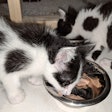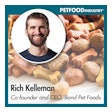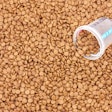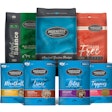.jpg?auto=format%2Ccompress&q=70&w=400)
According to Euromonitor International, rabbits, guinea pigs, chinchillas and other small herbivores are growing in popularity, particularly in urban areas. Their small size, life span and the fact that they do not need as much attention and exercise as a larger pet has made them popular with busy professionals and those living in apartments.
According to a Mintel report on petfood trends in the US, the petfood market (non-dog/cat) has experienced a 15.7% growth rate from 2006-2008. The small animal segment made an estimated US$681.8 million in 2006 and rose to US$788.9 million this year. An annual report by the Pet Food Manufacturers' Association (PFMA) in the UK said the national small animal market was up 2% on volume and 6% on value to £56 million (US$109 million). PFMA now collects population data on a whole range of pet species beyond dogs and cats. This is highlighting the growing popularity of smaller pets such as rabbits, which now number more than a million out of a small animal total of 2 million.
Small animals, big mouths
There are many food and treat options available for these small mammals, according to Laura Duclos, PhD, but not all veterinarians are as knowledgeable about the nutritional needs of rabbits and guinea pigs as they are about cats and dogs. According to Dr. Duclos, the bulk of small animals' diets should be:
-
Continual access (free feeding) to grass hay such as timothy, oat or brome. These options are high in fiber, help maintain proper weight and help prevent dental disease and malocclusion.
-
Low-fat pellets, fortified with vitamins and minerals. This food option is needed to supply the daily nutrient requirements of the animals. The pellets should consist mainly of hay, not alfalfa, and beet pulp should be avoided as an ingredient as it may lead to intestinal blockage and is low in nonfermentable fiber. Pellets with corn should also be avoided, according to Dr. Duclos, because the simple carbohydrates promote obesity and intestinal dysbiosis.
-
Clean, vitamin-fortified water. Essential for all living things, good ol' H20 is especially important for smaller animals-like ferrets and chinchillas-to maintain overall health, teeth growth and a shiny, thick coat.
Consumers who own small animals, just like their dog- and cat-owning counterparts, want more than just the average fare for their little, furry friends. The small animal petfood and treat market, therefore, follows many of the trends the dog and cat market track, but in its own unique way.
1. Humanization
Primetime television is fixated on pets with shows like Pet Star and America's Greatest Dog , so it's no surprise smaller animals are starting to share the spotlight. With the release of the animated film Ratatouille , Disney/Pixar also let loose two treats for the creatures the movie features. Le Bon Croissant, a nutritious treat shaped just like a croissant for all small animals, according to the company, has an easy to grab shape and crunchy texture that promotes small animals' natural chewing instinct. Le Quiche Lorraine - also for a variety of small pets and looking far too convincingly like the human dish of the same name - is made with a secret French recipe, according to the treat maker. The treat combines a crunchy crust outside with a fresh carrot center, inviting critters to start munching.
2. Probiotics
Food supplements that boost immune function and overall health in pets are a hot topic in the dog and cat food market, and the small animal food market has taken notice. Through their research, Zeigler Bros. has developed Vitality Pak, branded as Vpak, an all-natural, nutritional feed additive that contains no antibiotics and is designed to improve overall health and resistance to disease.
"Vpak works to boost an animal's defense system by using bio-active compounds that stimulate their immune systems while supplementing essential nutrients," said Tom Zeigler, PhD, chairman of Zeigler Bros. and an expert in nutritional immunology. The best results from Vpak have been demonstrated when offered throughout an animal's complete lifecycle. Zeigler Bros. can offer Vpak by request in any of the diets they currently formulate.
G-Whiz for Small Animals is a dietary supplement developed by Earth's Balance that provides essential amino acids that help digest the undermetabolized proteins that produce nitrogen waste (urine ammonia), the cause of cage odors. When added to a small animal's regular diet, according to the company, it helps prevent cage odor, extends litter life and makes animals smell cleaner.
3. Organic
USDA-certified organic may be a hard seal to come by, but small animal petfood companies are often beating their larger animal equivalents to that punch. Take for instance, Oxbow Enterprises Inc. and its recent release of Organic Rabbit and Organic Guinea Pig. The diets, according to the company, have been specially formulated to mirror the nutrition, rabbits and guinea pigs would find in their natural environments. The food also features balanced omega 3 and 6 to improve skin and coat, high-fiber hay to support digestion and anti-oxidants to build immunity, according to Oxbow.
4. Natural
In a natural setting, small herbivores have opportunity to seek a wide variety of plants and grasses for their high fiber, forage based diets. Sunaturals Food & Treats offers a plethora of all-natural food blends, mixes and treats for almost every small animal imaginable. Natural herbs, flowers and greens are blended with berries, vegetables and grains to yield holistic formulas rich in phytonutrients and natural antioxidants, according to the company. Sunaturals also attests that their products are free of artificial colors, flavors and preservatives.
5. Bottled water
While formulated daily drinks for dogs and cats seem to be flooding the market, bottled water for small companion animals may be a little bit harder to come by. That is, until Special Waters SAS launched Water Little. The company is the leading manufacturer in Europe of enriched drinks for domestic animals and recently released its innovative products in the US. The bottled water contains only natural spring water, organic/natural active ingredients and no added sugar, salt or flavoring, according to Special Waters. Water Little has three specific formulas available for hamsters, guinea pigs, rabbits and ferrets.


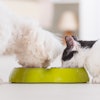

.jpg?auto=format%2Ccompress&fit=crop&h=167&q=70&w=250)




